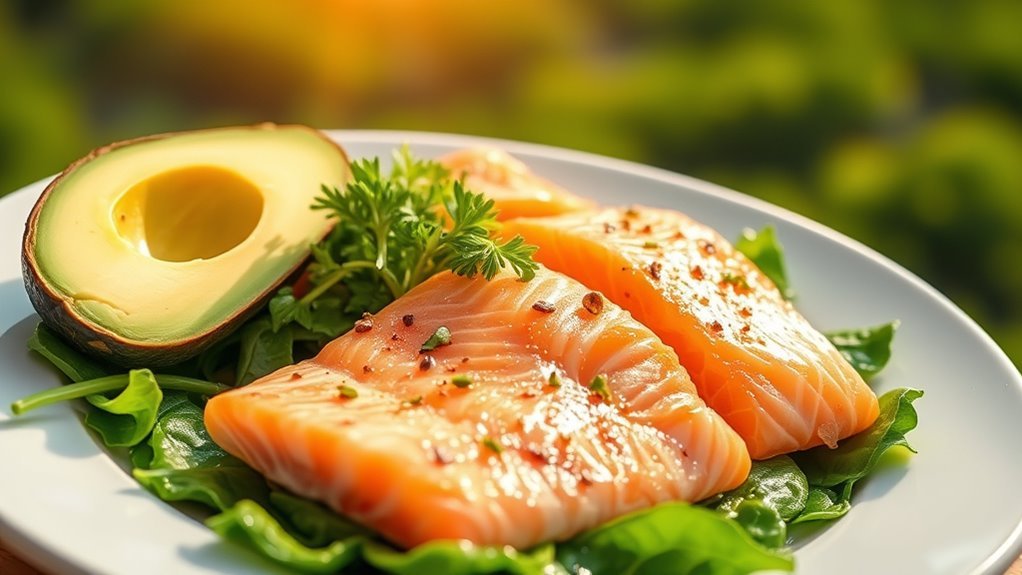The keto diet can be beneficial for fatty liver disease by promoting fat metabolism and improving insulin sensitivity. By reducing carbs and incorporating healthy fats, you might see a decrease in liver fat accumulation and inflammation. However, it’s essential to maintain nutritional balance and monitor your intake to avoid deficiencies. Before making dietary changes, it’s a good idea to consult a healthcare professional. Keep exploring to better understand how keto can impact your liver health.
Understanding Fatty Liver Disease

Fatty liver disease, which occurs when excess fat accumulates in liver cells, can lead to serious health complications if left unchecked. Understanding this condition is imperative for effective disease management. You might not realize that fatty liver often arises from factors like obesity, diabetes, and excessive alcohol consumption. If you’re experiencing symptoms such as fatigue or discomfort, it’s essential to consult a healthcare professional for proper diagnosis and support. Early intervention can markedly improve liver function and overall health. Adopting lifestyle changes, including a balanced diet and regular exercise, can help reduce fat accumulation in the liver. Additionally, monitoring essential vitamins and minerals during dietary changes is crucial for overall health. Stay proactive in managing your health, as addressing fatty liver can lead to greater freedom and energy in your life.
The Basics of the Keto Diet

The ketogenic diet, or keto, is a low-carb, high-fat eating plan designed to shift your body into a state of ketosis, where it burns fat for fuel instead of carbohydrates. Key principles of the diet involve drastically reducing carbohydrate intake while increasing healthy fats, which can lead to various metabolic benefits. Understanding these fundamentals is essential for effectively managing conditions like fatty liver disease. Research supports that a correctly followed keto diet can improve metabolic health, which may be particularly beneficial for individuals with fatty liver.
What Is Keto?
Keto, short for ketogenic diet, is a low-carbohydrate, high-fat eating plan designed to shift your body into a state of ketosis. In this metabolic state, your body becomes efficient at burning fat for energy instead of carbs. Understanding keto fundamentals is essential to successfully maneuvering this diet, as it helps you differentiate between healthy fats and unhealthy ones. Many people have keto misconceptions, believing it’s just about cutting carbs without considering nutritional balance. In reality, a well-structured keto plan emphasizes whole foods, adequate protein, and a variety of healthy fats. By embracing these principles, you can enjoy the freedom of a diet that not only promotes weight loss but may also support liver health. Additionally, the science behind ketosis shows how the body shifts from carbohydrates to fats as its primary energy source, enhancing fat oxidation and altering energy processing.
Key Principles Explained
Understanding the key principles of the ketogenic diet is essential for anyone looking to harness its benefits effectively. At its core, the keto diet involves drastically reducing carbohydrate intake and replacing it with healthy fats. This shift forces your body into a state of ketosis, where it burns fat for fuel instead of carbs. Unfortunately, there are many keto misconceptions, such as the belief that all fats are bad. In reality, healthy fats can support fatty liver treatments by improving liver function and reducing fat accumulation. It’s vital to focus on whole, nutrient-dense foods while maintaining proper hydration. By understanding these principles, you can navigate the keto diet with confidence, potentially improving your liver health and achieving greater freedom in your dietary choices. Additionally, the macronutrient breakdown emphasizes a high-fat, low-carb approach that is fundamental to entering ketosis.
How the Keto Diet Affects Liver Health

While many people seek to lose weight through various diets, the impact of these dietary changes on liver health is essential, especially for those with fatty liver disease. The keto diet can have significant effects on liver health, particularly concerning liver inflammation and overall function. Here are three key considerations regarding the keto impact:
The keto diet can significantly influence liver health, especially for those with fatty liver disease.
- Fat Metabolism: The high-fat content can promote efficient fat metabolism, reducing liver fat accumulation.
- Insulin Sensitivity: By lowering carbohydrate intake, the keto diet may improve insulin sensitivity, potentially decreasing liver inflammation.
- Nutrient Intake: A well-formulated keto diet rich in nutrients can support liver health and repair mechanisms. Additionally, monitoring vitamin and mineral intake is crucial to prevent potential deficiencies that may affect liver function.
Potential Benefits of Keto for Fatty Liver
If you’re dealing with fatty liver disease, considering the potential benefits of a ketogenic diet might be worthwhile. Research suggests that a keto diet can help improve liver health by reducing fat accumulation in the liver, thereby decreasing inflammation. The high-fat, low-carb nature of keto encourages your body to utilize fat for energy, which may lead to weight loss—an important factor for reversing fatty liver. Additionally, the keto benefits include better insulin sensitivity, which plays a vital role in managing liver conditions. By stabilizing blood sugar levels and promoting metabolic flexibility, you may find that your liver health improves over time. Furthermore, it’s essential to be aware of potential nutrient deficiencies that can arise from restrictive eating habits while on a keto diet. Always consult a healthcare professional before making significant dietary changes to confirm the keto diet aligns with your unique health needs.
Risks and Considerations of the Keto Diet
Although the ketogenic diet offers potential benefits for those with fatty liver disease, it’s important to be aware of the associated risks and considerations. Misunderstanding keto can lead to increased liver inflammation and other health issues. Here are three key considerations:
The ketogenic diet may benefit fatty liver disease, but understanding its risks is crucial for health.
- Keto Misconceptions: Many believe that all fats are beneficial; however, consuming unhealthy fats can worsen liver health.
- Nutrient Deficiencies: The restrictive nature of keto may lead to deficiencies in essential vitamins and minerals, impacting overall well-being.
- Long-term Sustainability: The diet can be difficult to maintain, potentially leading to binge eating or other unhealthy behaviors, which could aggravate liver conditions. Additionally, monitoring nutritional intake is crucial for overall health when following a restrictive diet.
Being informed about these risks will help you make a balanced decision regarding the keto diet and its suitability for your health.
Research Findings on Keto and Fatty Liver
Research on the ketogenic diet’s effects on fatty liver disease has garnered attention, as it may offer an alternative approach to managing this condition. Recent keto research suggests that a high-fat, low-carb diet could improve liver function and reduce fat accumulation in the liver. Fatty liver studies indicate that the ketogenic diet can lead to significant weight loss, which is vital for reversing fatty liver disease. In some cases, participants showed decreased liver enzymes and improved insulin sensitivity. However, while findings are promising, it is important to evaluate individual responses and consult healthcare professionals before making dietary changes. Overall, the potential benefits of the keto diet for fatty liver warrant further exploration and personalized approaches to treatment.
Expert Opinions on Keto Diet for Liver Health
Experts highlight the importance of ketosis in supporting liver function, noting that it may aid in reducing fat accumulation in the liver. However, they also stress the need for nutritional balance to guarantee you’re getting the essential nutrients your liver requires. Understanding these perspectives can help you make informed decisions about the keto diet and its impact on your liver health.
Ketosis and Liver Function
When it comes to liver health, understanding how ketosis affects liver function is essential. The keto diet promotes ketosis, which can enhance liver metabolism and offer various benefits for liver health. Here are three key ketosis benefits:
- Reduced Fat Accumulation: Ketosis can help decrease fat storage in the liver, making it beneficial for those with fatty liver.
- Improved Insulin Sensitivity: A ketogenic approach may enhance insulin sensitivity, leading to better glucose control and reduced liver stress.
- Enhanced Fat Oxidation: Ketosis encourages the liver to utilize fat as a primary energy source, supporting overall liver function. Additionally, improved brain function can also be a positive outcome of following a ketogenic diet, contributing to overall health.
Nutritional Balance Considerations
While adopting a keto diet can offer potential benefits for liver health, it’s important to guarantee nutritional balance to avoid any adverse effects. Focusing solely on fats may lead to a lack of nutrient diversity, which is vital for overall well-being. You’ll want to incorporate a variety of low-carb vegetables, healthy fats, and adequate protein sources into your meal planning. This balance guarantees you’re not only supporting liver function but also providing your body with necessary vitamins and minerals. Consulting with a healthcare professional can help tailor the diet to your specific needs, promoting both freedom in food choices and adherence to a healthy lifestyle. Remember, a well-rounded approach can enhance the keto diet’s benefits for fatty liver. Additionally, including low-carb vegetables in your meals can significantly improve nutrient intake while maintaining ketosis.
Tips for Implementing Keto Safely With Fatty Liver
Implementing a ketogenic diet can be beneficial for those with fatty liver, but it’s crucial to approach it with care. Here are some tips to help you implement keto safely:
- Focus on Whole Foods: Prioritize nutrient-dense foods in your meal planning. Aim for low-carb vegetables, healthy fats, and quality protein sources to support liver health.
- Monitor Macronutrients: Keep track of your fat, protein, and carb intake. Maintaining a balanced ratio helps prevent excessive fat accumulation in the liver.
- Consider Supplement Options: Supplements like omega-3 fatty acids and vitamin E may assist liver function. Consult your healthcare provider to tailor options that suit your needs. Additionally, incorporating healthy fats into your diet can be crucial for optimal health and liver support.
Frequently Asked Questions
Can I Drink Alcohol on a Keto Diet With Fatty Liver?
You should be cautious about drinking alcohol on a keto diet, especially with fatty liver. Alcohol can negatively impact liver health, and certain types, like beer and sweet wines, are higher in carbs, which could disrupt ketosis. If you choose to drink, opt for low-carb options like spirits mixed with soda water. Always consult your healthcare provider to guarantee any alcohol consumption aligns with your overall health goals and liver condition.
How Long Does It Take to See Results on Keto for Fatty Liver?
You might start seeing results on a keto timeline within a few weeks, as your liver begins to recover. Many individuals report improvements in liver enzyme levels and overall liver health after about 4 to 6 weeks on the diet. However, the complete recovery can take longer, depending on individual factors. It’s important to monitor your progress and consult with a healthcare professional for personalized guidance throughout your journey.
Are There Specific Foods to Avoid on Keto With Fatty Liver?
When you’re on a keto diet with fatty liver, aren’t you curious about what to avoid? You should steer clear of processed foods and sugars, as they can worsen liver health. Focus on healthy fats like avocados and olive oil, while carb counting to keep your intake low. Additionally, limit high-carb fruits and grains. Prioritizing whole, nutrient-dense foods will support your liver and help you achieve your health goals more effectively.
Can I Exercise While Following a Keto Diet for Fatty Liver?
Yes, you can definitely exercise while following a keto diet for fatty liver. In fact, incorporating regular physical activity can enhance your overall health and support your keto meal planning. Just be mindful of your exercise intensity; moderate workouts are often best to avoid fatigue during your body’s adaptation to ketosis. Aim for a balanced routine that includes both aerobic and strength training to maximize benefits while maintaining energy levels.
Is Intermittent Fasting Recommended Alongside the Keto Diet for Fatty Liver?
Intermittent fasting can be like a refreshing change for your body, especially when combined with the Keto diet. This duo may enhance fat-burning and improve liver health. Studies suggest that intermittent fasting benefits, such as reduced inflammation and improved insulin sensitivity, align well with the Keto diet effects. However, it’s essential to listen to your body. Always consult a healthcare professional to tailor these approaches for your individual needs and goals.
References
- https://www.ncbi.nlm.nih.gov/pmc/articles/PMC6466620/
- https://www.ncbi.nlm.nih.gov/pmc/articles/PMC7300558/
- https://www.healthline.com/nutrition/keto-diet-fatty-liver
- https://www.hindawi.com/journals/jobe/2020/8821983/
- https://www.who.int/news-room/fact-sheets/detail/nonalcoholic-fatty-liver-disease
- https://www.liverfoundation.org/for-patients/about-the-liver/conditions/fatty-liver-disease/
- https://www.aasld.org/publications/practice-guidelines/clinical-practice-guidelines-fibrosis-in-nonalcoholic-fatty-liver-disease
- https://www.researchgate.net/publication/331371250_The_Ketogenic_Diet_and_Weight_Loss_A_Review_of_the_Literature


